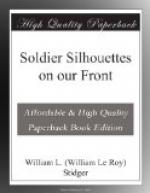These are Soldier Silhouettes that remain vivid until time dies, until the “springs of the seas run dust,” as Markham says:
“Forget it not ’til the crowns
are crumbled;
’Til the swords of the
Kings are rent with rust;
Forget it not ’til the hills lie
humbled;
And the springs of the seas
run dust.”
No, we do not forget scenes and moments like these in our lives.
Then there is the silhouette of the profile of the captain of a certain American machine-gun company who, in March, marched with his men into the Somme line. He was an old football-player back in the States, and we were having a last dinner together in Paris, a group of college men. After dinner, when we had finished discussing the dangers of the coming weeks, and he had told us that his major had said to him, “If fifteen per cent of us come out alive, I shall be glad,” and after we had drifted back to the old college days, and home and babies, and after he had shown us a picture of his wife and his kiddies, it became strangely quiet in the room, and suddenly he turned his face from us, with just the profile showing against the light of the window, and exclaimed: “My God, fellows, for a half-hour you have made me forget that there is a war, and I have been back on the old campus again playing football, and back with my babies.”
Then his jaw set, and I shall never forget the profile of his face as that set look came back and once again he became the captain of a machine-gun company.
Then there was the lone church service that my friend Clarke held one evening at a crossroads of France. He had held seven services that Sunday, one in a machine-gun company’s dugout, with six men; another with a group of a dozen men in a front-line trench; another with several officers in an officers’ dugout; another with a battery outfit who were “On Call,” expecting orders to send over a few shells; another with several men out in No Man’s Land, on the sunny side of an old upturned mass of tree roots; one in a listening-post, and finally this service with a lone sentry at a crossroads.
“But how did you do it?” I asked.
“I just saw him there,” Clarke replied, “and he looked lonely, and I walked up and said: ’How’d you like to have me read a little out of the Book?’
“‘Fine!’ he said.
“Then I prayed with him, standing there at the crossroads, and I asked him if he didn’t want to pray. He was a church boy back home, and he prayed as fine a prayer as ever I heard. Then we sang a hymn together. It was ‘Jesus, Lover of My Soul,’ and neither of us can sing much, but as I look back on it, it was the sweetest music that I ever had a part in making. The only thing I didn’t do was take up a collection. Outside of that, it was just as if we had gone through a regular church service at home. I even preached a little to him. No, not just preached, but talked to him about the Master.”




